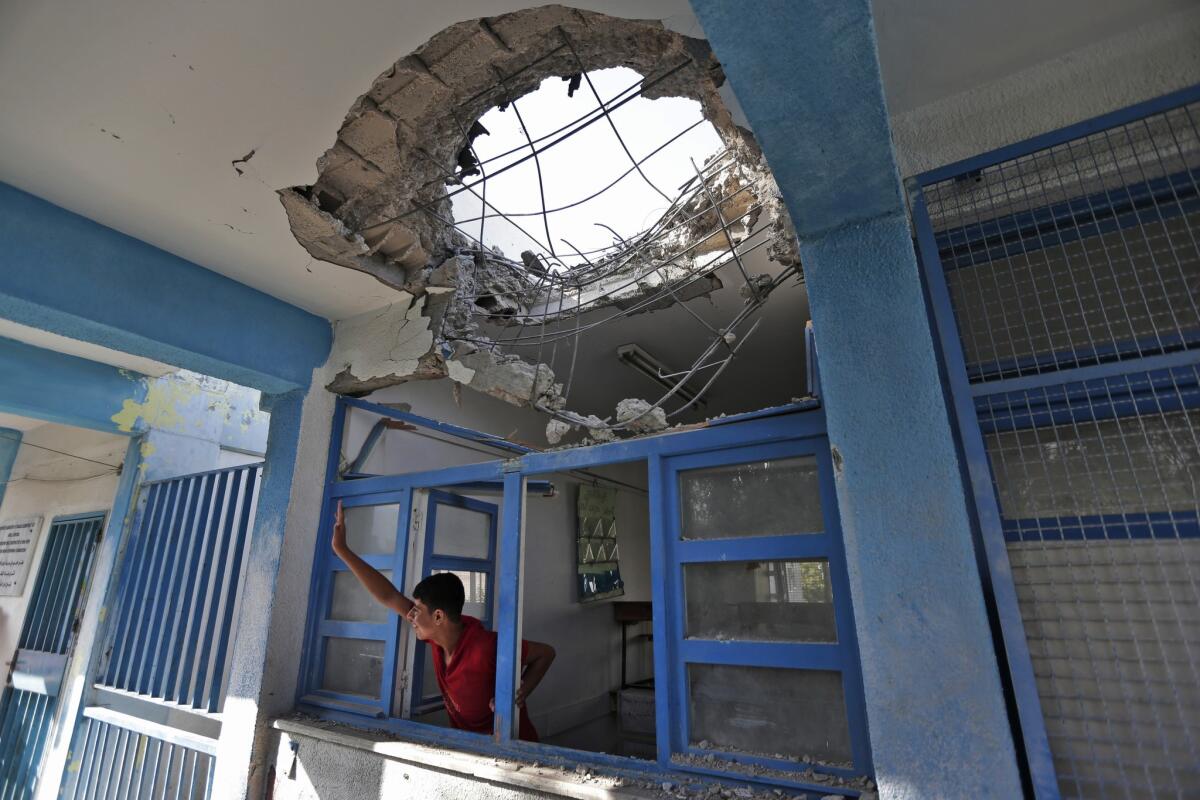White House condemns shelling of U.N. school in Gaza

The White House condemned the shelling Wednesday of a United Nations school in Gaza, issuing a carefully worded statement that avoided any mention of where the shells came from, despite the strong likelihood that it was Israeli fire.
The U.S. “condemns the shelling of a UNRWA school in Gaza, which reportedly killed and injured innocent Palestinians — including children — and U.N. humanitarian workers,” said National Security Council spokeswoman Bernadette Meehan. “We also condemn those responsible for hiding weapons in United Nations facilities in Gaza. All of these actions, and similar ones earlier in the conflict, are inconsistent with the U.N.’s neutrality.”
The Israeli military said it was investigating the shelling at the U.N. Relief and Works Agency site and suggested that its soldiers had come under fire from Hamas militants.
In condemning the action but not naming an actor, the U.S. statement illustrated how the administration tries to tread a line: expressing unhappiness without overly straining a relationship with Israel marked by tension on and off throughout President Obama’s tenure.
Relations between Israel and Washington are not at their lowest point. There has been no talk of cutting U.S. aid, and, in fact, Congress seems likely to increase U.S. backing for the Iron Dome missile defense program so crucial in protecting Israeli civilians from Hamas rockets.
But despite public insistence that “on the fundamentals, there’s not any distance” between the two, as deputy national security advisor Ben Rhodes said Wednesday morning, strains have been increasingly visible.
Over the weekend, U.S. officials sharply condemned statements from some Israeli leaders who attacked Secretary of State John F. Kerry in personal terms.
“It is disappointing and surprising that Israel would choose to lash out and criticize its most stalwart supporter — especially at a time when Israel is facing increasing isolation in the international community,” said a senior administration official, speaking on condition of anonymity to discuss diplomatic relations.
U.S. and Israeli officials on Tuesday denounced as fake a supposed transcript published by some Israeli news outlets that purported to show Obama lecturing Prime Minister Benjamin Netanyahu.
Privately, however, administration officials left little doubt that they believed someone in the Israeli government had peddled the document in an effort to make Obama look bad.
“It’s deeply concerning to us, and it’s disappointing, because everything we have done — whether it’s Iron Dome, whether it’s the hours and hours the secretary’s put into the peace process or even just getting a cease-fire in place — has been designed to protect Israel’s security,” said State Department spokeswoman Marie Harf. “So whoever it is, you know, I don’t want to guess what their motives are, but it is concerning, and it’s disappointing.”
The strains in part reflect political dynamics on both sides. The Netanyahu government includes parties more hawkish than the prime minister, some of whom have criticized him as too ready to bend to the U.S. On the U.S. side, support for Israel’s conduct is particularly weak among younger and minority Democrats, who have been key voters for the president.
The nature of the fighting in Gaza heightens the unease.
“Surely there is a degree of tension between the U.S. and Israel,” said Frederic C. Hof, a former State Department official now a Middle East expert at the Atlantic Council. “It’s not about going after missiles and tunnels. It’s about military operations in densely populated areas, where aerial bombardment, artillery shelling and tank gunfire are being employed with inevitably — even if unintentionally — disastrous effects on innocent civilians.”
The Obama administration has sought to keep things civil, especially in public. Kerry responded to the criticism over the weekend by vowing support for Israel and his commitment to engage in peace talks — a far cry from Secretary of State James A. Baker III during George H.W. Bush’s presidency.
In a House committee hearing in 1990, Baker famously delivered this message to a new hard-line Israeli government: “The telephone number is 1-202-456-1414,” he said. “When you’re serious about peace, call us.”
On Wednesday, the State Department was careful not to directly condemn Israel.
“Nothing justifies the killing of innocent civilians who are seeking shelter in a U.N. facility,” Harf said, adding that the U.S. wants the Israelis “to take more steps to protect civilians.” But the U.S. needed more information before characterizing what had occurred, she said.
“We believe the U.N.’s neutrality should be respected and recognized by everyone,” she said. “We understand this is complicated.”
More to Read
Start your day right
Sign up for Essential California for news, features and recommendations from the L.A. Times and beyond in your inbox six days a week.
You may occasionally receive promotional content from the Los Angeles Times.







